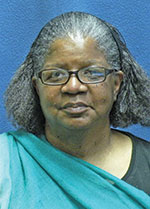Pastoral Ministries / Pearlette Springer
When the saints come marching in, Africa is represented
 “Then God said: Let us make human beings in our image, after our likeness” (Gen 1:26).
“Then God said: Let us make human beings in our image, after our likeness” (Gen 1:26).
Several years ago, while working for another diocese, I realized that many people were not aware that there were Catholic saints—hundreds of them—from the continent of Africa.
Oh yes, everyone knew and heard about St. Monica, who prayed her son, St. Augustine, back to the faith. But did they know that she was African?
In hindsight, I should not have been amazed and bewildered by this.
I grew up in a parish where the parishioners were 99% Black. The parish community was established in 1929 and built its first structure in 1945. And yet, not one image of Catholic saints reflected the physical characteristics of the people. Today, 93 years after the establishment of that parish, there is still only one saint of African descent hanging in that church.
Did the multitude of priests and religious that served there not know these saints existed? Is it not important for the people to see the universality of our Church?
This reality is not limited to that predominately Black Catholic parish.
Of the 10,000-plus saints, venerables, blessed and servants of God, hundreds—probably thousands—of them are of African descent.
For example, St. Martin de Porres of Peru, born of an African mother and Spanish father, is highly celebrated in the Black Catholic community in the United States.
Other well-known saints of African descent include Pope Victor I, Pope Gelasius, Pope Melchiades, St. Aurelius (an archbishop), St. Eugenius (an archbishop), St. Anthony of the Desert, Saints Aizen and Sazan, St. Matthew the Apostle, Saints Felicity and Perpetua,
St. Charles Lwanga and the Uganda martyrs, St. Josephine Bakhita, St. Benedict the Black and St. Moses the Black.
The blame for the lack of catechesis, the lack of inclusion, is not and should not be placed on one group of people or one culture of people, or on the pastoral leadership within our dioceses. We are all baptized priest, prophet and king. We are all called to the margins to care for the widows, the children, the poor and the marginalized. We are all called to share in the glory of God, the Christ who conquered death and the Holy Spirit who dwells among us. We are all called to share the good news.
So, let us not forget the big picture. Nor should we forget the people missing from the table and the conversation.
Let us not forget those of various descent who were present at the beginning of creation, the beginning of Judah, the beginning of Israel, the beginning of Christianity, the beginning of Catholicism.
Let us not forget the people of African descent who were present at the birth of Christ, the death of Christ and the resurrection. And the people of African descent who were present at Pentecost.
Let us not forget the people of African descent who remain present today.
Sister Thea Bowman, the first Black member of the Franciscan Sisters of Perpetual Adoration, said the following:
We are not all alike. Emphatically not! We do not look alike. We do not sing, dance, pray, play, think, cook, eat, wash, clean, laugh, dress, or spit alike. Asians are not Europeans, are not Africans. Irish are not Italians, are not like French. Africans are not like Afro-Americans. Black folks are not alike. Folks from Louisiana are not like any other people in the world. Praise the Lord, we are not alike.

In a hallway of the Archbishop Edward T. O’Meara Catholic Center in Indianapolis hang the pictures of the six Black Catholics currently on the path to sainthood. It’s a beginning but should not be the end.
To close, I quote St. John Paul II:
Dear brothers and sisters: your Black cultural heritage enriches the Church and makes her witness of universality more complete. In a real way, the Church needs you, just as you need the Church. For you are part of the Church, and the Church is part of you.
Peace be with you!
(Pearlette Springer is the coordinator of Black Catholic Ministry in the archdiocese. She can be reached at pspringer@archindy.org.) †
 “Then God said: Let us make human beings in our image, after our likeness” (Gen 1:26).
“Then God said: Let us make human beings in our image, after our likeness” (Gen 1:26).
